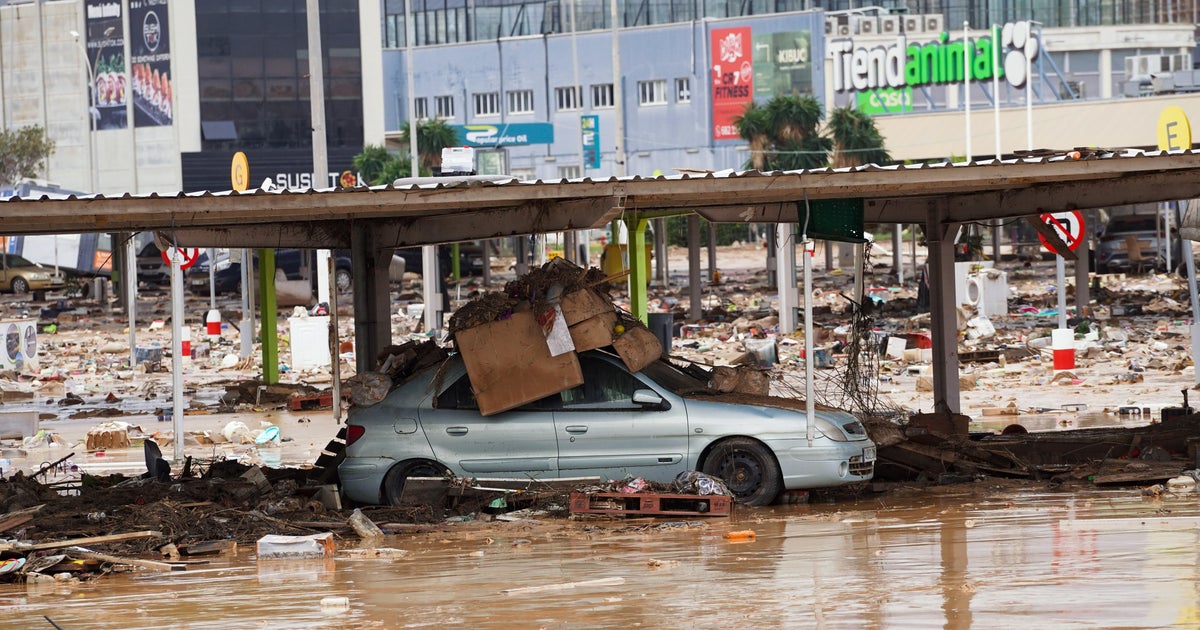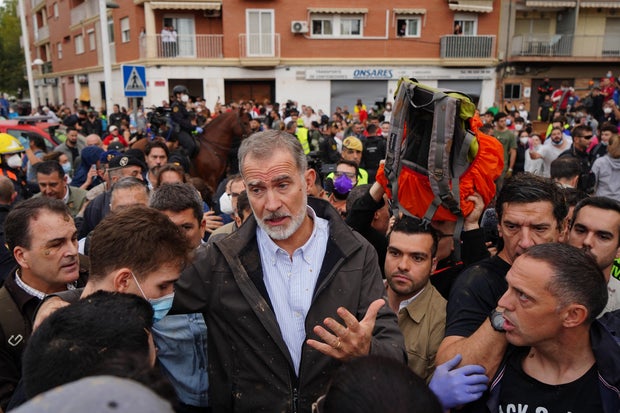CBS News
Spain’s flood nightmare continues as heavy rain hits Barcelona, Valencia tries to dig out

Barcelona, Spain — The recurrent storms in eastern Spain that led to massive flooding last week and killed at least 217 people, almost all of them in the eastern Valencia region, dumped rain further north Monday on Barcelona, prompting authorities to suspend commuter rail services and reroute flights as some highways were inundated.
Spanish Transport Minister Óscar Puente said he was suspending all commuter trains in northeast Catalonia, a region with 8 million people, at the request of civil protection officials. Cell phones in Barcelona screeched with an alert for “extreme and continued rainfall” on the southern outskirts of the city. The alert urged people to avoid any normally dry gorges or canals.
Puente said the rains had forced air traffic controllers to change the course of 15 flights operating at Barcelona’s airport, located on the southern flank of the city, and the national airport operator later said a total of 50 flights at the hub were cancelled on Monday.
Alex Juarez/Anadolu/Getty
Several highways were closed due to flooding, with images posted on social media showing vehicles along a low-lying section of one artery partially submerted.
Classes were cancelled in Tarragona, a city in southern Catalonia about halfway between Barcelona and Valencia, after a red alert for rains was issued.
Anger boils over at King Felipe in devastated Valencia
Meanwhile, in beleaguered Valencia, the search continued for bodies inside houses, parking garages and thousands of wrecked cars still strewn about the streets, on highways, and in canals that channeled last week’s deluge into populated areas.
Citizens, volunteers and some 10,000 soldiers and police were deployed to help in the gargantuan clean-up effort as residents try to dig their homes and possessions out of a thick layer of mud and debris.
A crowd of angry survivors hurled insults and mud at King Felipe VI and Queen Letizia as they visited the hard-hit Valencia suburb of Paiporta on Sunday.
The crowd shouted “Get out!” and “Killers” among other insults as the monarch and other officials tried to talk to residents, prompting bodyguards to open umbrellas to protect the VIPs as the crowd of several dozen launched mud their way.
MANAURE QUINTERO/AFP/Getty
Many Valencians have been infuriated by both the government’s response to the disaster and the lack of warnings that such an inundation was coming. Some 3,000 residents in Valencia were still without electricity and internet access was limited on Monday. There have been sporadic reports of looting, too, with at least 20 people arrested from Sunday night into Monday.
Spain’s Mediterranean coast is buffeted by autumn storms that can cause flooding every year, but this year brought the most destructive flash floods in recent memory.
Scientists link the scale of the disaster to climate change.
Human-caused climate change has doubled the likelihood of storms like last week’s deluge in Valencia, according to a partial analysis issued on Oct. 31 by the World Weather Attribution group, which is made up of dozens of international scientists who study global warming’s role in extreme weather.
Spain had suffered through drought conditions for almost two years, which made the flooding much worse because the parched ground was too hard to absorb the sudden downpour last week.
CBS News
U.S., Europe investigating devices detonated at air DHL cargo hubs in U.K. and Germany

U.S. and European law enforcement agencies are working together to investigate whether incendiary devices detonated in July at DHL logistics hubs in Germany and the U.K. were part of a larger operation directed by Russian Intelligence services (in particular, the GRU — Russian military intelligence), the highest level of the Russian government or by outside individuals acting in the interests of Russia, a source familiar with the matter said.
Officials are working to determine whether the larger operation was to place similar devices on aircraft servicing the U.S. and U.S. allies. The Wall Street Journal first reported the alleged plot targeting U.S. aircraft.
The 2025 Homeland Threat Assessment published at the end of October said the U.S. continues to be concerned about threats to the aviation and air cargo systems, including the “potential use of the air cargo supply chain to ship concealed dangerous and potentially deadly items.”
DHL said in a statement that it was aware “of two recent incidents involving shipments in our network. We are fully cooperating with the relevant authorities to protect our people, our network and our customers’ shipments.”
“We continually adjust our security posture as appropriate and promptly share any and all relevant information with our industry partners, to include requirements and recommendations that help them reduce risk,” the Transportation Security Administration said in a statement.
“Over the past several months, as part of a multi-layered security approach, TSA worked with industry partners to put additional security measures for U.S. aircraft operators and foreign air carriers regarding certain cargo shipments bound for the United States, in line with the 2021 TSA Air Cargo Security Roadmap,” the TSA’s statement continued.
The FBI declined to comment.
contributed to this report.
CBS News
Boeing machinists vote to accept labor contract, ending 7-week strike

Boeing’s 33,000 unionized machinists on Wednesday voted to approve the plane manufacturer’s latest contract offer, ending a seven-week strike that had halted production of most of the company’s passenger planes.
The union said 59% voted to accept the contract. Members have the option of returning to work as soon as Wednesday, but must be back at work by Tuesday, November 12, the union said in a statement.
Union leaders had strongly urged members to ratify the latest proposal, which would boost wages by 38% over the four-year life of the contract, up from a proposed increase of 35% that members of the International Association of Machinists and Aerospace Workers (IAM) had rejected last month.
The revised deal also provides a $12,000 cash bonus to hourly workers and increased contributions to retirement savings plans. The enhanced offer doesn’t address a key sticking point in the contentious talks — restoration of pensions — but Boeing would raise its contributions to employee 401K plans.
Average annual pay for machinists, now $75,608, would climb to $119,309 in four years under the current offer, Boeing said.
The vote came after IAM members in September and October rejected lesser offers by the Seattle-based aerospace giant.
“In every negotiation and strike, there is a point where we have extracted everything we can in bargaining and by withholding our labor,” the International Association of Machinists and Aerospace Workers stated last week in backing Boeing’s revised offer. “We are at that point now and risk a regressive or lesser offer in the future.”
Acting U.S. Labor Secretary Julie Su has played an active role in the negotiations, after recently helping to end a days-long walkout that briefly closed East and Gulf Coast ports.
The Boeing strike that began on Sept. 13 marked the latest setback for the manufacturing giant, which has been the focus of multiple federal probes after a door plug blew off a 737 Max plane during an Alaska Airlines flight in January. The incident revived concerns about the safety of the aircraft after two crashed within five months in 2018 and 2019, killing 346 people.
Boeing in July agreed to plead guilty to conspiracy to commit fraud for deceiving regulators who approved the 737 Max.
During the strike, Boeing was unable to produce any new 737 aircraft, which are made at the company’s assembly plants in the Seattle area. One major Boeing jet, the 787 Dreamliner, is manufactured at a nonunion factory in South Carolina.
The company last month reported a third-quarter loss of $6.1 billion.
contributed to this report.
CBS News
11/4: CBS Evening News – CBS News

Watch CBS News
Be the first to know
Get browser notifications for breaking news, live events, and exclusive reporting.









